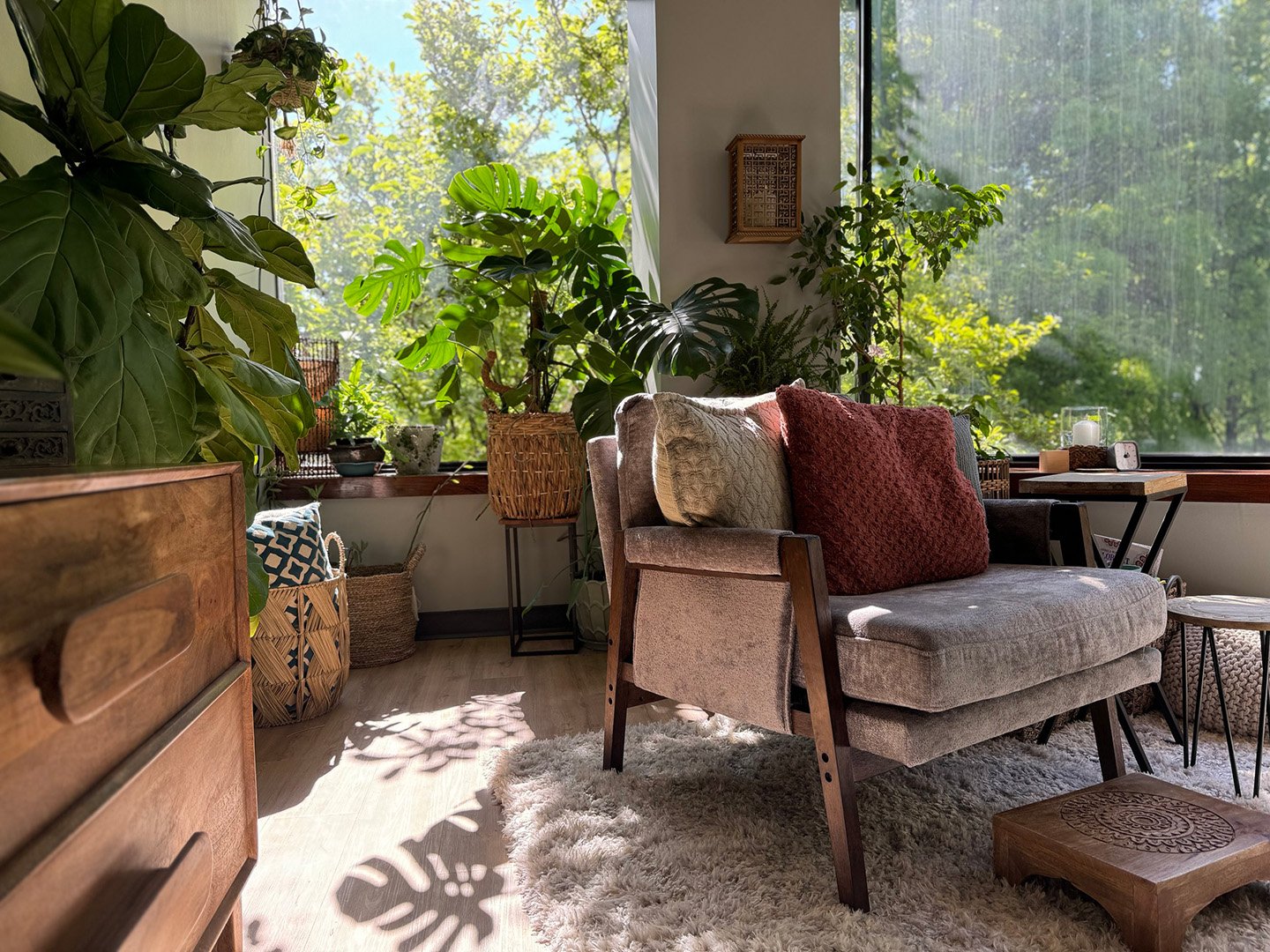
Glossary of Neurodivergent Therapy Lingo
𖥸
Disclaimer
This glossary is for educational and marketing purposes only. We hope this glossary can help you get to know us a little. We do our best to stay up to date with both research and lived-experiences in the worlds of neurodivergence and trauma, and other somatic stuff. We strive to stay up to date with the most respectful and honoring language and believe language is important, knowing we also have internalized ableism and privileges that keep us from seeing ourselves and others completely clearly. We continually strive nevertheless to understand the unique experience of the client we are sitting with and use your language, supporting your connecting with yourself, your life, and your world.
Neurodivergent vs. Neurodiverse
Neurodivergent: A person with a brain that differs from neurotypical brains that affects how their brain works. A neurodivergent person will have different strengths and challenges based on this.
Neurotypical: Thinking, behaving, and viewing the world in a way that is considered the norm by the general population.
Neurodiverse: Short for “neurological diversity”. The concept noting that the variations in brains is on a spectrum that leads to differences in how we as individuals interact and perceive the world.
Digging Deeper
Neurodiversity means that everyone’s brains work differently to a degree.
Neurodivergent is a person whose brain differences affect how their brain works, giving them both strengths and challenges, including having brain differences from those that are neurotypical.
Neurotypical means to have a brain, thoughts, and behaviors that meet the ‘norm’ for the population.
Neurodivergent is an umbrella term for various diagnoses:
Autism Spectrum Disorder
Attention Deficit and Hyperactivity Disorder
Dyslexia
Complex Post Traumatic Stress Disorder
Sensory Processing Disorder
Dyscalculia
Dysgraphia
Bipolar Disorder
Epilepsy
Obsessive Compulsive Disorder
Tic Disorders
Schizophrenia
Misophonia
. . .just to name a few . . .
Many of these diagnoses may share symptoms and also share stigmatization from the neurotypical norms.
On the other hand, everyone has neurodiverse brains but not everyone is neurodivergent. Atif Choudhury, the CEO of “Diversity and Ability”, explains it this way “We are all neurodiverse, but we are not all marginalized by it”.
A World Not Designed for Us
Neurodivergent people live in a world not designed for them. This means they have everyday experiences that make doing things more difficult than a neurotypical person.
Imagine a neurotypical grocery shopping experience. You’d go to the store with your grocery list, grab your items, check out, and go home. But some neurodivergent experiences of the same “mundane” task could be:
A person with dyslexia may spend a long time at the store because it takes them longer to read the ingredients and nutrition facts on the items they want.
A person with sensory processing issues may feel overwhelmed by the bright lights, smells, and noise in the store and may not be able to complete their shopping trip.
A person with epilepsy may not even be able to go to the store to pick up a few things due to the possibility of an episode.
There can be hundreds of examples for every unique neurodivergent individual that expresses the debilitating barriers in everyday activities that neurotypical people do not have to experience due to the world being set up for them.
Intersectionality of Missed Diagnoses in Neurodivergent Individuals
Neurodivergent people are marginalized by the neurotypical world and its expectations. Neurodivergent BIPOC (Black, Indigenous, People of Color) individuals experience substantially more barriers due to systemic injustices.
These barriers start even before a diagnosis is given, as BIPOC individuals are significantly underdiagnosed, therefore not given the accommodations or care necessary for their health:
“In the U.S., white children are approximately 19% more likely to be diagnosed with autism than Black children and 65% more likely than Hispanic children” (Furfaro, 2017)
“Indigenous children have the lowest autism diagnosis rates among all racial groups in the U.S. One study found indigenous children were 13% less likely to be identified as Autistic” (Bennett et al., 2021)
Misdiagnosis Bias
Not only are neurodivergent BIPOC individuals underdiagnosed, but they are often incorrectly diagnosed before getting the correct diagnosis - if they receive that at all. In a study by Mandell et al. (2007) they found that black children were 5.1 times more likely to receive conduct or adjustment disorders before being correctly diagnosed with ADHD or Autism.
Perpetuating Cycles of Marginalization and Stigma
These misdiagnoses and delays in appropriate care not only deny BIPOC neurodivergent individuals the support they need but also perpetuate cycles of marginalization and stigma.
The consequences are huge, affecting access to:
educational resources
mental health support
opportunities for personal and professional development
Without accurate diagnoses, children may face disciplinary actions in school rather than receiving the tailored interventions that could help them thrive.
Also, the lack of culturally competent healthcare professionals exacerbates these issues, as providers may not fully understand or respect the unique experiences of BIPOC families.
The Takeaway as We Understand it
Understanding and embracing neurodiversity is more than just acknowledging that brains work differently; it’s about actively addressing the systemic barriers that make life harder for those who don’t fit the neurotypical mold.
As we work towards a more inclusive society, it’s crucial to advocate for better diagnostic practices, cultural competency in healthcare, and educational reforms that acknowledge and support the diverse needs of all individuals.
Our Approach to Neurodiversity
Here at The Hope Preserve
We’re passionate about providing a space that’s as geared toward neurodivergent nervous systems as we can manage in a suburban commercial office space. We strive to keep ourselves educated about neurodiversity and are honored to help you process your experiences in a world not designed for you.
You’re invited to come be yourself with us.
We’d love to support you.
Glossary Index
Thinking of getting started?
We’d love to help you find the right fit
Use this calendar to chat with our front desk without the phone tag,
or get a same-day call/text/email back with the quick contact form.

